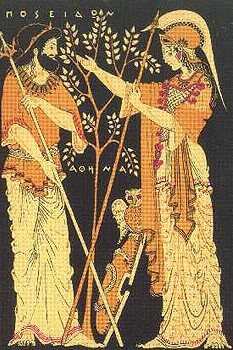In all religions you must first be touched with olive oil before becoming a member of the community.
In the books of the old testament the olive and olive oil are often appointed: suffice it to say that the dove of Noah's Ark brought back an olive branch from Mount Ararat, Armenia mountain. This is dated 11000 BC and it was meant to be the sign that life was restored on earth after the “deluge”!!
Olive oil was also the first prize in the Greek Olympian games . At those time is was based on Oleaster’s olives as the wild version of the current Olive Trees were richer of polyphenols with the related health benefits ( see Health section of this web site).
In Greece there were many flourishing olive groves; particularly rich was Attica and in particular the plain near Athens. On the other hand the olive was the sacred plant of the goddess Athena and it was she who, in competition with Poseidon for possession of Attica, won by bearing an olive tree from her rod vibrated into the ground. In her honor is celebrated the holiday called Panathenaic, where athletes, who won the race received amphoras containing refined oil: this is a very particular form of amphorae, with paunchy body, short neck and small looped handles called like this for their particular use: panatenaiche.
From Greece the olive oil was exported to Magna Grecia where the cultivation of the olives was florid were those in Southern Italy : Sibari and Taranto / Salento;
The olives demanded much care, that could be expensive, but the owners of olive groves were well rewarded for their hardships: not only the cuisine but also the bathrooms, games, gymnasiums and even funerals, required the use of large quantities of oil.
In the Roman world no other condiment was used for cooking. Romans made the olive oil known in all Europe.
Gallipoli (" Citta’ Bella’) is a baroque town in the center of Salento that must be included in every visit to Apulia. In 1600 Gallipoli became the world capital for Olio Lampante. This oil was used to fire up the lamps in the world. There are 10 churches in this small town, one for each of the "Confraternite" who developed and became rich by delivering the Lamp Oil from its harbour.
Lamp oil was produced in underground mills ( " Frantoio ipogeo") where workers were used to live day and night with their donkeys used to move the big milling stones ("macine or mollazze).
You can have a virtual tour here:
http://www.italiavirtualtour.it/dettaglio.php?id=94100
Giovanni Presta, from Gallipoli, developed in 1793 after 10 years of hard work interviewing farmers in Italy, Spain and Greece , the first essay on Olive Oil :
Degli Ulivi, Delle Ulive e del modo di cavar l’ Olio
(Olive trees, Olives and how to extract Oil)
After intensive search I found the book and I strongly recommend it to all who have a passion olive oil. I can help to get a copy.
Here is a quick extract translated in English :
Leaves never fall from the branches
Olive trees never die. You can cut them as you want after a while you see green leaves developing
Flowers are mono-petal and hermaphrodite
You can use its wood for heating fire. The fire is long lasting , fragrant, joyous and very warm ( 1000 additional Kcal/kg vs other woods)
You can extract from its branches a liquid (ragia) that will dilver a magic parfumes when burned into the house
You can easily conserve its fruits for all year
Olive fruits are gorgeous. You can eat them cold, fried, cooked, salty or sweet
If you press olives you get oil : the most perfect, delicate and sophisticated food and medicine
There is no waste from olive trees. Even the byproducts of olives milling can make money : nocciolino per heating, vegetal water for feeding the soil.

